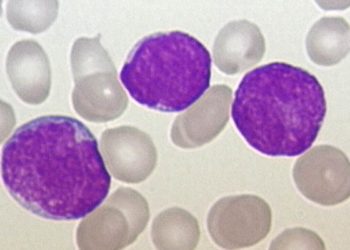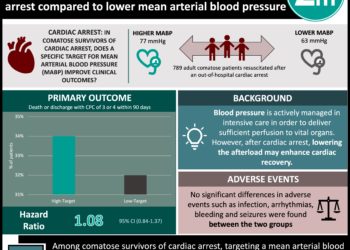Laboratory values and treatment associated with DKA-related cerebral edema [Pediatrics Classics Series]
Image: PD
1. Among children admitted to 1 of 10 medical centers for diabetic ketoacidosis management, elevated serum urea nitrogen concentrations and low partial pressures of carbon dioxide were associated with significant increases in risk of developing cerebral edema.
2. Lack of pronounced serum sodium rise and use of bicarbonate for treatment were also associated with significantly increased cerebral edema risk.
Original Date of Publication: January 2001
Study Rundown: Among children presenting in diabetic ketoacidosis (DKA) either during an initial type 1 diabetes mellitus I (T1DM) presentation, following bodily stresses, or medication noncompliance, 1% will experience cerebral edema. At the time of this study, mortality occurred in 40-90% of these individuals, accounting for 50-60% of T1DM-related childhood deaths. However, before this study’s publication, there was limited information regarding cerebral edema risk factors among children with T1DM. Researchers found that elevated serum nitrogen concentrations and low partial pressures of carbon dioxide were associated with significantly increased risk of children hospitalized for DKA developing cerebral edema. In addition, lack of pronounced increases in serum sodium with treatment and use of bicarbonate were also associated with significantly increased risk of cerebral edema development. This study is limited by an inability to detect the possible influence of other confounders as well as to detect the potential role of variables that did not produce noticeable changes in clinical data. This was the first large, controlled study to investigate the role of cerebral edema-associated risk factors among children being treated for DKA. It was proposed that each of these factors likely contributed to the development of cerebral edema due to potential contributions to cerebral ischemia. While this study helped lay the foundation for our understanding of cerebral edema risk, no exact pathophysiologic mechanism is confirmed. Currently, multiple theories including vascular compromise and edema due to osmotic differences along with this cerebral ischemia hypothesis exist. Other risk factors found to not be statistically significant in this study have been proven influential in subsequent studies. These include young age and DKA as the first presenting symptom of DM.
Click to read the study The New England Journal of Medicine
In-Depth [multi-center, case-control study]: Through a review of records at 10 pediatric hospitals, all children with DM-related cerebral edema treated between1982-1997 were included in analyses. The record of any child who had died during admission in this time period was also included in analysis. Records of included patients had evidence of confirmed DKA (serum glucose > 300 mg/dL, venous pH < 7.25 or serum bicarbonate < 15 mmol/L, and urine ketones), altered mental status, and a radiologic or pathologic diagnosis of cerebral edema or clinical improvement following cerebral edema treatment. For each child with cerebral edema, 6 control patients were included for comparison – 3 patients selected randomly among the other patients with DKA and 3 patients matched by age among the other patients with DKA. Demographics, treatments, laboratory values, and calculated laboratory results were included for analysis. One-way analysis of variance was completed to analyze continuous variables and X2 tests were used to analyze categorical variables.
Of the 6977 DKA-related admissions to the 10 centers, 61 (0.9%) had cerebral edema. After controlling for covariates, comparison of children with cerebral edema to the random control group revealed a 1.7 times increase in cerebral edema risk per increase in urea nitrogen of 9 mg/dL from presentation and a 3.4 times increase risk per 7.8 mmHg decrease in carbon dioxide partial pressure from presentation (RR = 1.7, p < 0.003; RR = 3.4, p < 0.001, respectively). Multivariate analysis, with control for covariates, comparing patients with cerebral edema to matched controls showed significantly increases in risk associated with high urea nitrogen (RR = 1.8 per 9 mg/dL increase, p < 0.01), low arterial carbon dioxide (RR = 2.7 per decrease of 7.8 mmHg, p < 0.01), slow increases in serum sodium concentration during therapy (RR = 0.6 per increase of 5.8 mmol/L/hr, p < 0.0.5), and bicarbonate treatment (RR = 4.2, p < 0.01).
By Leah H. Carr and Lewis R. First, MD
© 2012-2014 2minutemedicine.com. All rights reserved. No works may be reproduced without expressed written consent from 2minutemedicine.com. Disclaimer: We present factual information directly from peer reviewed medical journals. No post should be construed as medical advice and is not intended as such by the authors, editors, staff or by 2minutemedicine.com. PLEASE SEE A HEALTHCARE PROVIDER IN YOUR AREA IF YOU SEEK MEDICAL ADVICE OF ANY SORT.








